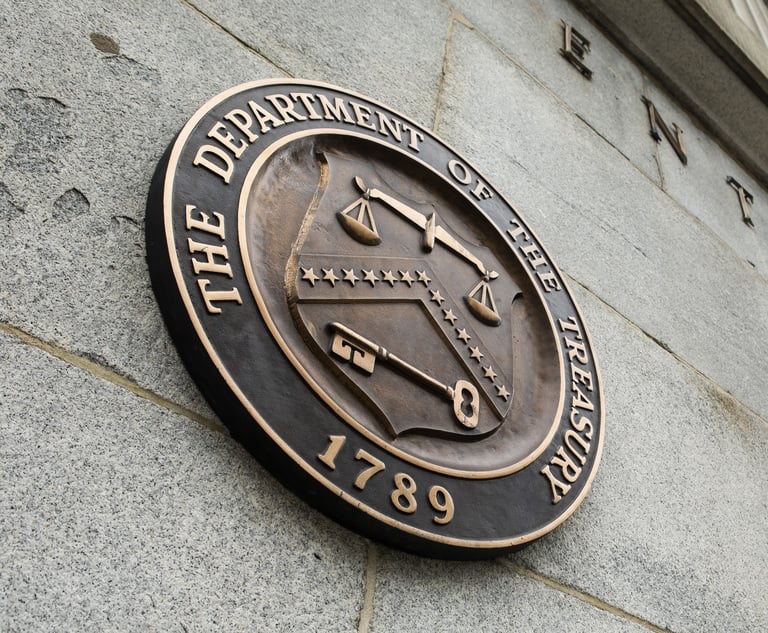Should I Take the Economic Injury Disaster Loan? It's a Hard Maybe for Me.
Like for many other small businesses, revenues started to slow down, while expenses remained the same or increased. We had to buy new equipment and software that would facilitate working remotely.
May 28, 2020 at 09:56 AM
7 minute read
 Lydia Desnoyers Owner of Desnoyers CPA LLC.
Lydia Desnoyers Owner of Desnoyers CPA LLC.In early March, right before our worlds turned upside down, I was busy working with my marketing team on our new website. While the new website was being built, we created a temporary landing page for immediate access to important tools such as our client portal and online appointment scheduling tool. Clients who prefer to send their documents electronically or those who don't have time for an office visit use the portal to get their taxes done remotely.
On the other hand, we also have many clients who prefer to come into the office to get their taxes filed in person. Either way—our goal is to make it easy. "Let's put the booking tool front and center so clients can quickly find it and schedule their appointments." I recall instructing the design team.
Just three or four days later, I emailed again "Abort! Abort! Abort! No in-office appointments!! Please only show the option for virtual meetings." Everything was starting to shut down due to COVID-19, and it seems like all of our daily lives changed overnight.
Like for many other small businesses, revenues started to slow down, while expenses remained the same or increased. We had to buy new equipment and software that would facilitate working remotely.
I am a CPA who practices what I preach, so we had funds set aside for emergencies, but for a global pandemic with no end date in sight? I don't think anyone could have planned for the financial impact that COVID-19 has had on small businesses. So, when we small business owners started hearing about loans and "grants" for small businesses, we all jumped on the opportunity for this "free money."
But as most us of know, there is no such thing as "free money. There is ALWAYS a cost. The question is "Is the cost worth it?"
I applied for the Economic Injury Disaster Loan (EIDL) on March 31. Days turned into weeks and I still had not heard anything about my application. Finally, on May 3, I received an email stating that my loan is being processed. Then on May 17, I got the notification that my application had been approved.
A big sigh of relief … that was short-lived. Why? I read the fine print!
- One of the attractive parts about the EIDL is that you do not have to make your first payment until 12 months from when you receive the funds. During that time, interest is accruing and, as with most loans, your payments first go to accrued interest and then toward principal. But here is where it gets weird. The payment terms go on to read "Each payment will be made when due even if at that time the full amount of the loan has not yet been advanced or the authorized amount of the loan has been reduced." Come again? So not only is there a possibility that I may not get the entire loan right away, but I have to make the payments when they are due even if I have not received the full amount of the loan by then?
- About collateral, the SBA website states "given the severity of the COVID-19 pandemic and its economic impacts, the SBA will make reasonable efforts to work with applicants toward a favorable decision," however, the loan agreement states the following about collateral: For loans over $25,000, "Borrower hereby grants to SBA, the secured interest […] in and to any and all "Collateral."" The agreement goes on to define collateral as ALL tangible and intangible personal property that Borrow now owns or shall acquire … It further goes on to say that the "Borrower will not sell or transfer any collateral" and borrower will not accept future advances under any superior liens on the collateral securing this loan. We all hope that we will be in position to pay back the loan when the payments become due and that the issue of collateral won't even be a factor. But between now and when the loan is paid in full, you basically cannot sell anything you currently own without first requesting permission from the SBA. So three years down the line, if you need to sell some old equipment or furniture to get a little extra cash to keep you afloat, you have to remember to submit a request to the SBA, and hope that they approve your request.
- For the life of the loan, borrowers are required to carry hazard insurance to cover at least 80% of the insurable value of collateral (remember collateral is pretty much everything you own at the time of the loan). It is unclear if you can use the loan proceeds to pay for said insurance. Whether or not you can, we are all trying to save money, not incur additional expenses.
- Another expense that a borrower may have to bear is the cost of hiring an independent accountant to perform a review of their financial statements. There is an entire section labeled "Books and Records" which stipulates that borrowers must maintain "current and proper books of account" and "Upon written request of the SBA, borrower will accompany such statements with an 'Accountant's Review Report.' This can be pretty costly and assuming you still have loan funds available after payroll, rent, etc., it is unclear if you can use any part of the loan proceeds to cover this cost.
- On May 13, a man in Atlanta, Georgia was arrested for misusing proceeds from a Paycheck Protection Program (PPP) loan he took to keep his company afloat. He spent $1.5 million on jewelry and leased a 2019 Rolls Royce. You don't have to be a genius to know that the paycheck protection loan should be used on paychecks, not flashy jewelry and cars. This was a clear-cut case of fraud and he should be subject to the severe civil and criminal penalties that come with these relief programs. But what happens to little ole us if we simply forget to notify the SBA that we sold an old printer they claimed as collateral or if we forget to obtain the required hazard insurance? Depending on the severity of the faux-pas, the EIDL comes with the following penalties: - The loan goes into default and becomes immediately due in full; - The borrower becomes civilly liable to the SBA in an amount equal to 1.5 times the original principal amount; or - Imprisonment I highly doubt you will go to prison for selling an old printer, but one could lose sleep wondering if an inadvertent omission can cause you to have to pay the loan back in full ahead of your planned timeline. Despite several attempts to contact the SBA customer service line, I have not been able to reach anyone to get clarification on the terms of the loan. Applicants are given up to 30 days to e-sign the loan agreement and I encourage everyone to take their time to read and understand the loan agreement before signing it. Your need for the loan may outweigh the questionable terms of the agreement, but it is better to know what you are signing up for rather than to be caught off guard later. And, if you want to hire an attorney or accountant to help you understand the loan agreement, you may have to get permission from the SBA—oh, did I not mention that? If you're thinking about taking advantage of EIDL for your business, approach the EIDL application as you would any other contract. Be sure to read the fine print, ask questions and seek clarification before you sign.
Lydia Desnoyers operates Desnoyers CPA LLC in Miami.
This content has been archived. It is available through our partners, LexisNexis® and Bloomberg Law.
To view this content, please continue to their sites.
Not a Lexis Subscriber?
Subscribe Now
Not a Bloomberg Law Subscriber?
Subscribe Now
NOT FOR REPRINT
© 2025 ALM Global, LLC, All Rights Reserved. Request academic re-use from www.copyright.com. All other uses, submit a request to [email protected]. For more information visit Asset & Logo Licensing.
You Might Like
View All

Don’t Forget the Owner’s Manual: A Guide to Proving Liability Through Manufacturers’ Warnings and Instructions
5 minute read

Trending Stories
- 1Lawsuit Against Major Food Brands Could Be Sign of Emerging Litigation Over Processed Foods
- 2Fellows LaBriola LLP is Pleased to Announce that Alisha Goel Has Become Associated with The Firm
- 3Law Firms Turn to 'Golden Handcuffs' to Rein In Partner Movement
- 4Friday Newspaper
- 5Public Notices/Calendars
Who Got The Work
J. Brugh Lower of Gibbons has entered an appearance for industrial equipment supplier Devco Corporation in a pending trademark infringement lawsuit. The suit, accusing the defendant of selling knock-off Graco products, was filed Dec. 18 in New Jersey District Court by Rivkin Radler on behalf of Graco Inc. and Graco Minnesota. The case, assigned to U.S. District Judge Zahid N. Quraishi, is 3:24-cv-11294, Graco Inc. et al v. Devco Corporation.
Who Got The Work
Rebecca Maller-Stein and Kent A. Yalowitz of Arnold & Porter Kaye Scholer have entered their appearances for Hanaco Venture Capital and its executives, Lior Prosor and David Frankel, in a pending securities lawsuit. The action, filed on Dec. 24 in New York Southern District Court by Zell, Aron & Co. on behalf of Goldeneye Advisors, accuses the defendants of negligently and fraudulently managing the plaintiff's $1 million investment. The case, assigned to U.S. District Judge Vernon S. Broderick, is 1:24-cv-09918, Goldeneye Advisors, LLC v. Hanaco Venture Capital, Ltd. et al.
Who Got The Work
Attorneys from A&O Shearman has stepped in as defense counsel for Toronto-Dominion Bank and other defendants in a pending securities class action. The suit, filed Dec. 11 in New York Southern District Court by Bleichmar Fonti & Auld, accuses the defendants of concealing the bank's 'pervasive' deficiencies in regards to its compliance with the Bank Secrecy Act and the quality of its anti-money laundering controls. The case, assigned to U.S. District Judge Arun Subramanian, is 1:24-cv-09445, Gonzalez v. The Toronto-Dominion Bank et al.
Who Got The Work
Crown Castle International, a Pennsylvania company providing shared communications infrastructure, has turned to Luke D. Wolf of Gordon Rees Scully Mansukhani to fend off a pending breach-of-contract lawsuit. The court action, filed Nov. 25 in Michigan Eastern District Court by Hooper Hathaway PC on behalf of The Town Residences LLC, accuses Crown Castle of failing to transfer approximately $30,000 in utility payments from T-Mobile in breach of a roof-top lease and assignment agreement. The case, assigned to U.S. District Judge Susan K. Declercq, is 2:24-cv-13131, The Town Residences LLC v. T-Mobile US, Inc. et al.
Who Got The Work
Wilfred P. Coronato and Daniel M. Schwartz of McCarter & English have stepped in as defense counsel to Electrolux Home Products Inc. in a pending product liability lawsuit. The court action, filed Nov. 26 in New York Eastern District Court by Poulos Lopiccolo PC and Nagel Rice LLP on behalf of David Stern, alleges that the defendant's refrigerators’ drawers and shelving repeatedly break and fall apart within months after purchase. The case, assigned to U.S. District Judge Joan M. Azrack, is 2:24-cv-08204, Stern v. Electrolux Home Products, Inc.
Featured Firms
Law Offices of Gary Martin Hays & Associates, P.C.
(470) 294-1674
Law Offices of Mark E. Salomone
(857) 444-6468
Smith & Hassler
(713) 739-1250






